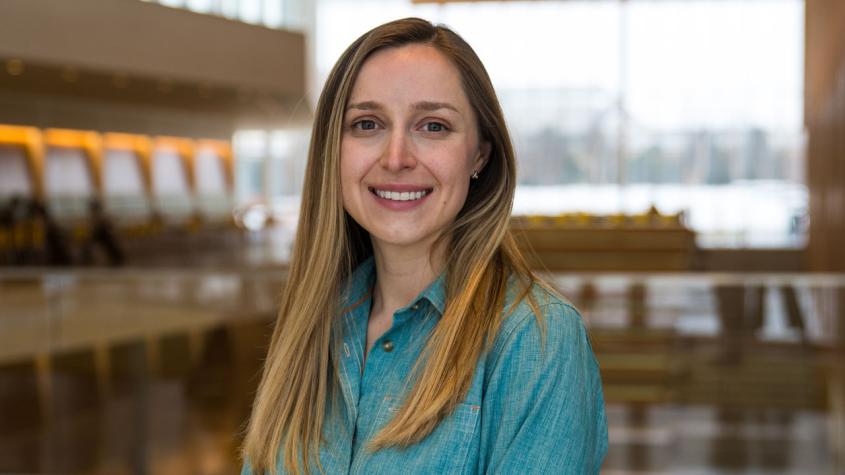New faculty profile: Dr. Kelly Knickelbein
The Cornell University College of Veterinary Medicine (CVM) has recently welcomed many new faculty members to our academic departments, each one bringing a unique set of skills and experience that enriches our college every day. In this Q&A series, you'll get to know their interests, expertise and more.
Dr. Kelly Knickelbein, assistant clinical professor in the Section of Ophthalmology
Q: What has been your academic/career path leading up to Cornell?
A: I attended veterinary school at Penn, then completed an equine medicine and surgery internship at Rhinebeck Equine, followed by an ophthalmology specialty internship and ophthalmology residency at the University of California, Davis.
Q: What drew you to CVM?
A: Cornell has a very strong reputation in veterinary ophthalmology. The clinical and research advancements that have occurred at Cornell impact the entire veterinary ophthalmology community and have strengthened our ability to help animals with eye disease.
Q: What is your clinical/scientific area of expertise?
A: Veterinary ophthalmology is a comparative specialty, and I truly enjoy getting to work with many different species in the clinic. I am particularly passionate about clinical ophthalmology in horses, and my research interests include genetic mechanisms of hereditary ocular disorders in horses and applications of advanced imaging techniques to the equine eye.
Q: What drew you into this area? Any specific experiences, mentors or influences that helped guide you?
A: I first developed an interest in ophthalmology as a veterinary student. One of the unique aspects of the field is the intricacy of ophthalmic microsurgery, and the first time I got to watch an ophthalmic surgery I was hooked. Another thing that attracted me to the specialty was the opportunity to develop long-term relationships with patients and clients, as many ophthalmic diseases require long-term treatment and monitoring. I have been incredibly fortunate to have several outstanding mentors throughout my training who continue to inspire me daily.
Q: What past professional work are you most proud of and why?
A: I am most proud of the work I have done to identify genetic contributions to the development of ocular squamous cell carcinoma in horses. Squamous cell carcinoma is the most common tumor to affect the eyes of horses and it can have devastating consequences, including eye removal or euthanasia. The ability to identify horses at increased risk of this disease and implement preventative measures gives these horses a better prognosis.
Q: What about your clinical work, research or teaching innovations are you most excited for or proud of and why?
A: I am excited to be able to provide patients and clients with top level care. I am also really excited about the opportunity to contribute to the training of residents, interns and veterinary students. My mentors have had a really positive impact on my training and career opportunities, and I hope to pass that on to future ophthalmologists and veterinarians.
Q: What clinical or scientific questions are you looking to answer next or areas you plan to explore?
A: I hope to continue to elucidate genetic mechanisms of ocular disease in horses. Many of the diseases ophthalmologists see in animals have a genetic component, and there is a lot of work to be done to better understand why these sight-threatening diseases occur, how to prevent them and how to best treat them.
Q: What’s something most people don’t know about you?
A: I have a llama named Clark.
Q: What’s the best part of being a clinician?
A: Working with animals and like-minded people.
Q: What’s the most challenging part?
A: Diagnosing diseases for which we do not yet have effective treatment options.
Q: What are the benefits of working at CVM? At Cornell?
A: Working at Cornell provides the opportunity to collaborate with experts in many fields, not just within CVM but across the university. This provides ample opportunities to advance the field of veterinary ophthalmology.





